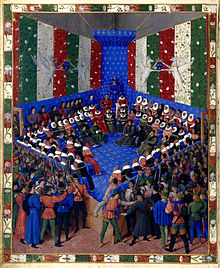Lit de justice

Lit de justice ( bed of justice ) is an expression of the royal justice of the medieval and early modern rule ( ancien régime ) in France and means a special session of the parliament in the presence of the French king . The expression was derived from the baldachin- roofed king's throne in the corner of the assembly room, which is reminiscent of a four-poster bed. The bed was made up of five pillows, the king sat on one of them, two supported the arms, one the back and the fifth the feet. The seat in front of the throne was empty for private conversations.
This custom goes back to the time of the gatherings, when the Merovingian Frankish king held his court session in the open air, during which he was protected by the canopy. At the meeting, which was usually held in the “Grand Chamber” (French: la Grande Chambre, Grand 'Chambre, Grand-Chambre) of the Paris Parliament in the royal palace, now the Palace of Justice, the greats of the empire were present: Princes of Blood, dukes and pairs, cardinals and marshals , the Dauphin . The king used to open these meetings according to a fixed rite and gave the word with the formulation: "My Chancellor will present the rest" ("Mon chancelier dira le reste.") To the Chancellor as speaker, who then read out the royal declaration - Government declaration, edict, declaration of war, declaration of peace. Even crimes of nobles such as high treason were dealt with in this assembly, especially in the 14th century. The presence of the ruler transferred the jurisdiction of the parliament, which then acted as an adviser, to the king - according to "adveniente principe, cessat magistratus" - Latin . for "When the ruler appears, the magistrate is silent (as judge)". However, not every presence of the king in Parliament was also a “bed of justice”. Especially Philip IV and his three sons Louis X , Philip V and Charles IV often attended the parliamentary session, which could take place in front of any of the 12 parliaments.
Since Louis XIII. the lit de justice remained limited to the Paris parliament, under Louis XIV it was hardly convened because he almost completely disempowered parliament. It was under Louis XV. revived and also served to enforce the absolutist royal rule, but aroused increasing resistance. The last was under Louis XVI. held in Versailles .
literature
- Elizabeth AR Brown, Richard C. Famiglietti: The Lit de Justice. Semantics, Ceremonial, and the Parlement of Paris 1300-1600 (Supplements of the Francia , 31). Thorbecke, Sigmaringen 1994, ISBN 3-7995-7331-3 ( online ).
- Sarah Hanley: The Lit de Justice of the Kings of France. Princeton University Press, Princeton 1983.